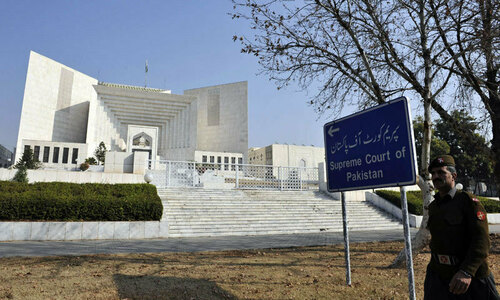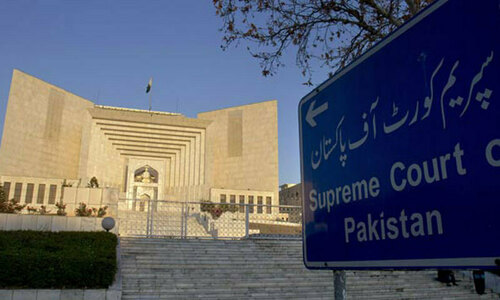ISLAMABAD: The legislature cannot undo a court judgement on merit, but it can nullify the effects of the judgement, emphasised Justice Syed Mansoor Ali Shah of the Supreme Court on Monday.
“The government cannot bring an individual back to service when the Supreme Court in a case had already held that the individual had been terminated rightly,” Justice Shah observed during the hearing of a set of petitions seeking review of the Aug 17 judgement rendering almost 17,000 government employees jobless.
Justice Mansoor Ali Shah was a member of a five-judge bench, headed by Justice Umar Ata Bandial, which took up the petitions.
The courts cannot be approached a second time seeking reversal of a judgement that upheld the employees’ termination orders, the judge added in his observations.
“We are unable to understand the scheme why the parliament made such a law of reinstating the government employees when each of the cases of the terminated employees was already discussed and decided at different forums.”
The courtroom No 1, seized with a number of review petitions, was packed with sacked employees while a large number of them stood outside the Supreme Court premises.
On the eve of his retirement, Justice Mushir Alam had on Aug 17 declared as illegal and unconstitutional a PPP-era law, known as the Sacked Employees (Reinstatement) Ordinance Act 2010 (SERA), under which a number of people were employed or promoted.
Barrister Aitzaz Ahsan, representing officers of the Intelligence Bureau (IB), argued that if the Supreme Court’s judgement was set aside, many sacked employees would have to be reinstated.
The counsel recalled that the judgement which upheld the termination of some of the IB officers had been reviewed. But Justice Qazi Muhammad Amin Ahmed reminded him that the judgement was never reviewed. Although certain remarks were expunged, the termination was never set aside.
Aitzaz Ahsan contended that the caretaker government, which issued the termination orders, had no authority to do so.
“Had I been dismissed from service by Halaku Khan, will it be legal,” the counsel wondered, but Justice Aminuddin Khan observed that “you would challenge it”.
Mr Ahsan argued that the Aug 17 judgement was “entirely misconceived”.
Justice Shah wanted to know “what was so special about the employees who were appointed from 1993 to 1996”.
“What will be the status of a law which sanctions five advance increments for government employees serving in Islamabad, but excludes all others from this benefit.”
Justice Qazi Amin reminded Aitzaz Ahsan that he was the interior minister when these employees were appointed, adding that the Intelligence Bureau followed a rigorous recruitment process, but apparently did not adhere to it in the case under consideration.
Mr Ahsan denied that the procedure was not followed and pointed out that appointments in the IB were outside the purview of the Federal Public Service Commission.
Parliament and judicial scrutiny Iftikhar Gillani, who represents a group of school teachers in the petition, cited a number of judgements by the apex court itself to establish that it cannot examine a law made by parliament.
But Justice Bandial observed that in case of violation of fundamental rights, the judiciary had an obligation to intervene.
Iftikhar Gillani, however, contended that the Supreme Court had no jurisdiction to question the legislature’s wisdom or motive even if a law was promulgated with mala fide intent. Otherwise, it will open a Pandora’s box, the counsel said.
Although the counsel argued that his clients were reinstated through the ordinance and not through the SERA, he emphasised that even after expiry of the ordinance, the right to continue with the job remains in favour of the employee.
He said the ordinance was a law unto itself and reflects the legislative powers of the president.
The case will be taken up again on Tuesday.
Published in Dawn, December 7th, 2021















































